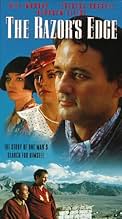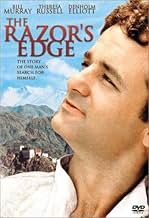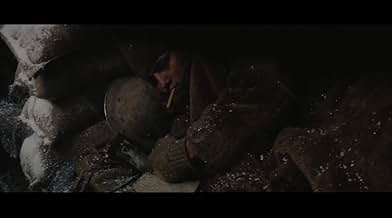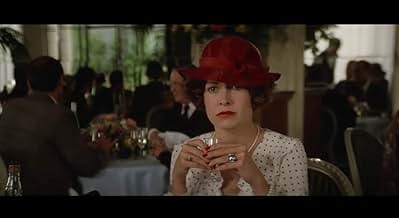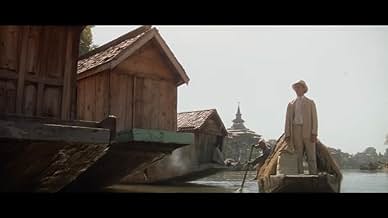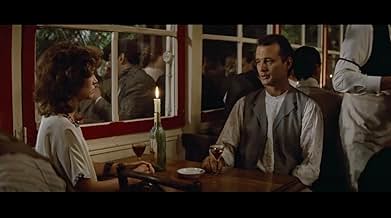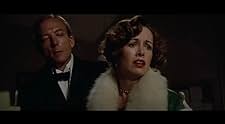NOTE IMDb
6,4/10
6,2 k
MA NOTE
Ajouter une intrigue dans votre langueHe had everything and wanted nothing. He learned that he had nothing and wanted everything. He saved the world and then it shattered. The path to enlightenment is as sharp and narrow as a ra... Tout lireHe had everything and wanted nothing. He learned that he had nothing and wanted everything. He saved the world and then it shattered. The path to enlightenment is as sharp and narrow as a razor's edge.He had everything and wanted nothing. He learned that he had nothing and wanted everything. He saved the world and then it shattered. The path to enlightenment is as sharp and narrow as a razor's edge.
- Réalisation
- Scénario
- Casting principal
André Maranne
- Joseph, the Butler
- (as Andre Maranne)
Robert Manuel
- Albert
- (as Roberet Manuel)
Avis à la une
10rickbkis
I was prepared to hate this movie, when I first rented it. It was a 'curiosity pick': I liked the title, I didn't have anything else in mind, and my thought was, of course, "Bill Murray!?"
It turned out to be one of my all-time favorite movies in the 'character-transformation' genre.
It's a compelling story of choices in life and how those choices affect or disaffect perceptions of that life. Murray is perfection in this role, because we seem him change from something we recognize to something quite different. It is a palpable and comprehensible transformation - the movie draws us in, it allows us to change with him.
The rest of the characters are well cast and provide definitive counterpoint to the protagonist - the bon-vivant aristocratic uncle Elliot who simply lives his life appreciatively, the unthinking and manipulative Isabel concerned only with her own comforts and social standing, the uncertain Sophie that allows her uncertainty to trap and destroy her, the practical yet contemplative Raaz who challenges Darrell's notion of things, constructively, and leads him to further his quest. Good character development, all around.
Finally, I was impressed with the faithfulness to the book. It's difficult for a movie to be that, and still be an watchable movie.
It turned out to be one of my all-time favorite movies in the 'character-transformation' genre.
It's a compelling story of choices in life and how those choices affect or disaffect perceptions of that life. Murray is perfection in this role, because we seem him change from something we recognize to something quite different. It is a palpable and comprehensible transformation - the movie draws us in, it allows us to change with him.
The rest of the characters are well cast and provide definitive counterpoint to the protagonist - the bon-vivant aristocratic uncle Elliot who simply lives his life appreciatively, the unthinking and manipulative Isabel concerned only with her own comforts and social standing, the uncertain Sophie that allows her uncertainty to trap and destroy her, the practical yet contemplative Raaz who challenges Darrell's notion of things, constructively, and leads him to further his quest. Good character development, all around.
Finally, I was impressed with the faithfulness to the book. It's difficult for a movie to be that, and still be an watchable movie.
Elegant but facile version of the Maugham novel, a passion project for Murray who is good in parts of the film but flat in others. On it's own an okay film hampered by over-length but compared to the Tyrone Power/Gene Tierney original, which has its own problems, it's a pale shadow. A good deal of the fault for that lies in both the direction and the performances. The general ennui of the performances may in fact be laid at the director's feet. All are capable actors as they've shown elsewhere but here be it a mismatch of actor/actress and part or lack of direction most founder.
Theresa Russell does the film's best work but even her Sophie is missing the bruised sorrow that made Anne Baxter's take on the part so compelling and won her the Oscar for best supporting actress. James Keach evaporates from the screen in a rather thankless role that John Payne managed to make an impression in with a show of quiet strength. Surprisingly the weakest of the star spots is Catherine Hicks, usually a very fine actress, adrift in her part. She exudes a warm presence on screen totally wrong for the heartless, mindlessly cruel Isabel that Gene Tierney playing with an icy edge made vivid.
A good try but only average.
Theresa Russell does the film's best work but even her Sophie is missing the bruised sorrow that made Anne Baxter's take on the part so compelling and won her the Oscar for best supporting actress. James Keach evaporates from the screen in a rather thankless role that John Payne managed to make an impression in with a show of quiet strength. Surprisingly the weakest of the star spots is Catherine Hicks, usually a very fine actress, adrift in her part. She exudes a warm presence on screen totally wrong for the heartless, mindlessly cruel Isabel that Gene Tierney playing with an icy edge made vivid.
A good try but only average.
I rented this movie strictly because Bill Murray was in it. He's always been one of my favorite comic actors. After seeing The Razor's Edge, my view of him changed forever. As much as I enjoyed his work before and after this film, his career development appears stunted.
In this film, Murray is brilliant and convincing as Larry Darrow, a man searching for his soul's peace, after a brutal event "awakened" him from his posh aristocratic life.
Murray is a comic genius, but his abilities as a dramatic actor have been woefully underused.
In this film, Murray is brilliant and convincing as Larry Darrow, a man searching for his soul's peace, after a brutal event "awakened" him from his posh aristocratic life.
Murray is a comic genius, but his abilities as a dramatic actor have been woefully underused.
It is a bit surprising that Hollywood ever made a film out of Somerset Maugham's novel "The Razor's Edge". This is because the story has a lot of existential elements and is far from the typical fare coming from the studios. Despite this, they made a 1946 version with Tyrone Power and a 1984 version with Bill Murray. Of the two, I prefer the 1946 version--some of which because it generally sticks closer to the novel. However, being 1946, the sexual elements were sanitized a bit....though it still is superior for several reasons...most notably Bill Murray's odd performance.
The story begins just before the US entered WWI. Some friends are gathered for a party before several of them head to Europe as volunteer ambulance drivers. Not surprisingly, this experience transformed Larry (Murray) and instead of coming home after the war, he stays in France. At first, his girlfriend (Catherine Hicks) supports this bohemian lifestyle for him, but after it's clear he's never returning home to his old patrician life, she marries another man. During the rest of the film, Larry works many low-paying jobs...enough to survive and enough to travel. He's on a journey to explore himself and life and eventually it takes him to India and the East.
At the same time, the film focuses on the folks Larry left behind back in Illinois. While they are all rich, they aren't necessarily happy. Some are a bit screwed up, others are totally out of control. The parallel between these shallow, stagnant rich folks and the poor but happy Larry is the gist of the film.
Bill Murray can be a very funny man and has made some wonderful films. That being said, he's all wrong for the film for two main reasons. Sometimes (particularly earlier in the movie) he seems a lot like Bill Murray, not the character in the novel. He is a bit of a smart aleck and his reactions seem like Murray in "Meatballs" or "Ghostbusters". However, a bit later, he often is 100% deadpan...much like he later did in "Broken Flowers" and "Lost in Translation". But then, oddly, some of the earlier personality and sarcasm still occasionally pokes through...which is not consistent with the story or character. As a result, it definitely blunts the impact of the story...a very important story since it focuses on the meaning of life and is supposed to be a story with great depth.
Another problem, though much less important, is that sometimes the film didn't try very hard to capture the era in which it was supposed to be set. In particular, the lovely Catherine Hicks looks great...and much like a woman who is living during 1984. Her hairstyle is wrong for 1916-1920. Fortunately, when the film got to 1929, her hair was period appropriate.
Overall, an interesting experiment that ultimately fell a bit flat. I appreciate the risk Murray took but ultimately it's a story that just doesn't quite hit the mark. This apparently was the prevailing attitude back in 1984 and the movie lost a lot of money....earning back less than half of its costs.
By the way, I wouldn't mind seeing a third version of this story. The basic story idea by Maugham is laudable...man's search for meaning. But the first film was a bit too tame and the second was just a bit of a mess. I'd love to see one that would correct this as well as sticking very close to the source material.
The story begins just before the US entered WWI. Some friends are gathered for a party before several of them head to Europe as volunteer ambulance drivers. Not surprisingly, this experience transformed Larry (Murray) and instead of coming home after the war, he stays in France. At first, his girlfriend (Catherine Hicks) supports this bohemian lifestyle for him, but after it's clear he's never returning home to his old patrician life, she marries another man. During the rest of the film, Larry works many low-paying jobs...enough to survive and enough to travel. He's on a journey to explore himself and life and eventually it takes him to India and the East.
At the same time, the film focuses on the folks Larry left behind back in Illinois. While they are all rich, they aren't necessarily happy. Some are a bit screwed up, others are totally out of control. The parallel between these shallow, stagnant rich folks and the poor but happy Larry is the gist of the film.
Bill Murray can be a very funny man and has made some wonderful films. That being said, he's all wrong for the film for two main reasons. Sometimes (particularly earlier in the movie) he seems a lot like Bill Murray, not the character in the novel. He is a bit of a smart aleck and his reactions seem like Murray in "Meatballs" or "Ghostbusters". However, a bit later, he often is 100% deadpan...much like he later did in "Broken Flowers" and "Lost in Translation". But then, oddly, some of the earlier personality and sarcasm still occasionally pokes through...which is not consistent with the story or character. As a result, it definitely blunts the impact of the story...a very important story since it focuses on the meaning of life and is supposed to be a story with great depth.
Another problem, though much less important, is that sometimes the film didn't try very hard to capture the era in which it was supposed to be set. In particular, the lovely Catherine Hicks looks great...and much like a woman who is living during 1984. Her hairstyle is wrong for 1916-1920. Fortunately, when the film got to 1929, her hair was period appropriate.
Overall, an interesting experiment that ultimately fell a bit flat. I appreciate the risk Murray took but ultimately it's a story that just doesn't quite hit the mark. This apparently was the prevailing attitude back in 1984 and the movie lost a lot of money....earning back less than half of its costs.
By the way, I wouldn't mind seeing a third version of this story. The basic story idea by Maugham is laudable...man's search for meaning. But the first film was a bit too tame and the second was just a bit of a mess. I'd love to see one that would correct this as well as sticking very close to the source material.
I saw this movie when it was released in 1984. Being a big Bill Murray fan drew me to it and the story did the rest. It was my first year in college and I dreamed of running away with nothing but some books and a canvas bag. I dreamed vicariously through this movie for awhile. Who hasn't wanted to travel the world anonymously? It is the essence of life, the secret to life, that is held in the dream that Mr. Murray must have had at some point in his lifetime that drove him to make this movie.
For all you naysayers out there: Movies don't have to be perfect. Some can be appreciated for the trash quality (Wild Things), some for crassness (Something About Mary), and others for a single scene (Saving Private Ryan). This movie is for dreamers who don't give a fck what everyone else is doing.
For all you naysayers out there: Movies don't have to be perfect. Some can be appreciated for the trash quality (Wild Things), some for crassness (Something About Mary), and others for a single scene (Saving Private Ryan). This movie is for dreamers who don't give a fck what everyone else is doing.
Le saviez-vous
- AnecdotesBill Murray made a deal with Columbia Pictures that he would appear in S.O.S. fantômes (1984) only if they financed this movie. Originally, no studio was interested in making the film until Dan Aykroyd suggested the deal to Murray. On the final day of shooting, Murray flew to New York City to start filming Ghostbusters.
- Citations
Tibetan Monk: The pathway to salvation is as narrow and as difficult to walk as a razor's edge.
- ConnexionsFeatured in At the Movies: Choose Me/The Razor's Edge/Full Moon in Paris (1984)
Meilleurs choix
Connectez-vous pour évaluer et suivre la liste de favoris afin de recevoir des recommandations personnalisées
- How long is The Razor's Edge?Alimenté par Alexa
Détails
- Date de sortie
- Pays d’origine
- Site officiel
- Langue
- Aussi connu sous le nom de
- El filo de la navaja
- Lieux de tournage
- Sociétés de production
- Voir plus de crédits d'entreprise sur IMDbPro
Box-office
- Budget
- 13 000 000 $US (estimé)
- Montant brut aux États-Unis et au Canada
- 6 551 987 $US
- Week-end de sortie aux États-Unis et au Canada
- 2 411 311 $US
- 21 oct. 1984
- Montant brut mondial
- 6 551 987 $US
- Durée
- 2h 8min(128 min)
- Couleur
- Rapport de forme
- 2.35 : 1
Contribuer à cette page
Suggérer une modification ou ajouter du contenu manquant


